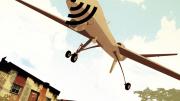Disruptive innovation works in developing economies, too—even where there is no established market leader to disrupt. Africa, the world’s poorest continent, has very little access to the outside world through telecommunications, especially the Internet. “How could you make it affordable and simple for a larger population to access these things that are now only available to the rich and skilled?” asks Clayton Christensen. “The traditional way would be to wire the place with wires like those for telephone and cable TV. That is very expensive. It would be cheaper to do it all with wireless technology—but that’s also expensive: you’ve got to build the towers, and the towers need electricity, so you need access to electricity.” So the market has not developed—meaning that there is no existing industry to disrupt.
“But how about this?” Christensen continues. “How about, every morning at 5:00 a.m., I launch an unmanned aircraft, with a footprint about the size of a kitchen table, that has satellite access to the Internet? And this drone just circles around this community all day long, giving the people wireless access via plane and not tower—at very low cost. The technology to do this exists now. You are competing with non-consumption. I’m certain that the bandwidth and the reliability of access are not as good as what we enjoy here. But it’s infinitely better than nothing.”









